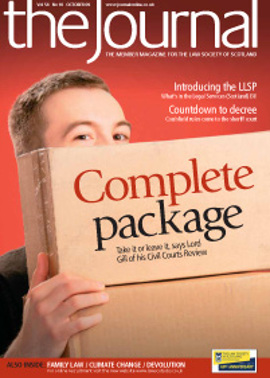Solicitor advocates and conflicts of interest
I read with interest the exchange between Angus Logan and John Scott on the issue of the future of solicitor advocates. I should say that I wholeheartedly agree with John Scott’s comments – particularly so far as they relate to the issue of conflict of interest. I appreciate that Mr Scott was commenting in particular within the sphere of criminal law. What he says is, however, just as apposite in relation to personal injury work. To suggest, as Mr Logan does, that independence is an attribute somehow peculiar to the bar, and that issues of conflict of interest only ever present themselves to solicitor advocates, is simply fallacious.
Mr Logan is right to point out that many personal injury cases are run under legal assistance schemes where unions simply act as referral agencies to the firms they instruct. Thus, these firms are, in these cases, acting speculatively. However, I take issue with the inference that in such circumstances a solicitor advocate who is a partner in the same firm that has instructed him or her, cannot truly be seen to be independent if the firm has a financial interest in the outcome. As Mr Scott points out, we frequently have to provide independent advice to a client where that advice may not be in the best financial interests of our firm. That is true of solicitors and solicitor advocates alike. It seems extraordinary to suggest that in these circumstances we somehow cannot or do not provide such independent advice.
Of course, in a very hypothetical sense a potential conflict does exist. However, what Mr Logan fails to recognise is that the problem of conflict applies in at least as great a measure to counsel practising in this area. Where a firm undertakes a case speculatively, because of the funding arrangements imposed by the referring union, that firm in turn asks counsel to accept instructions on a “speculative, judicial recoveries only” basis. Counsel will only be paid if (a) the case succeeds, and (b) his or her fees are recovered from the other side. The potential conflict for counsel is clear, since they too have a financial interest in the outcome.
Take, for example, the situation of the advocate acting on a speculative basis for a pursuer who has just been presented with a tender. The offer is objectively far too low. The chances of beating the tender are greater than 50%. The right advice to the client is to reject the tender and run the proof. However, to advise the client to do so is not only to gamble on the client’s behalf but to gamble on a very personal level. The advocate’s personal costs associated with running the proof are high. Take the tender and everyone gets paid. Reject the tender and there is a risk that no one gets paid.
This potential conflict is significantly worsened by the imposition of the “judicial recoveries only” stipulation. The instructing firm is asking counsel to accept a feeing arrangement whereby counsel will only be paid if their particular fee is recovered from the other side in negotiation of the instructing firm’s account of expenses – a process in which counsel is not involved and of which counsel is only advised when negotiations are concluded and a deal done.
Whilst I agree with Mr Logan that we require much greater discussion about solicitor advocates and their role and professional duties, I suggest that the issue of potential conflict of interest for solicitor advocates is in fact no greater – perhaps on occasion less – than that which exists across the profession as a whole in the field of personal injuries. Loss of fees for work which has been undertaken can sometimes be more easily absorbed within a firm than by an individual practitioner. This is particularly true where contingency feeing arrangements are constructed so that a percentage of the client’s damages will ultimately find its way back to the firm.
As a solicitor advocate who was formerly an advocate for 10 years, I hope I can look dispassionately at the practice of court work undertaken by both strands of the advocacy profession. It seems to me that whilst there may be theoretical issues of conflict of interest which arise from time to time for solicitor advocates, they are not so constant, nor so personally difficult, as those currently imposed upon counsel who undertake personal injuries work. For this reason I welcome the review of rights of audience (for which the Society of Solicitor Advocates fought), which will enable the whole system of rights of audience, for solicitor advocates and advocates alike, to be considered carefully.
In this issue
- The Combined Standard Clauses (2009 edition)
- Preserving a legal inheritance: settlement rights in the "Occupied Palestinian Territories"
- The European Court and the duty to investigate deaths
- Chief Executive's SGM address
- Shelter's online resources
- Musical copyright and contract
- The international swap shop
- Headline fortnight
- The Gill Report? What's not to like?
- Solicitor advocates and conflicts of interest
- Settlement in the West Bank
- Package deal
- RoS = economic value
- Defining the future
- Global leader?
- Dog's chance
- Coulsfield rules OK
- Money and your life
- Experts on the case
- At the hub, 10 years on
- Guardians: don't look to the Fund
- From the Brussels office
- Ask Ash
- Making the most of ABS
- Planning for growth
- The perils of posting
- ARTL: friend or foe?
- Where privacy prevails
- How was it for you?
- Agreeing rescues with creditors
- Adopting new solutions
- Divorce for gender change
- Scottish Solicitors' Discipline Tribunal
- Book reviews
- Website review
- A safe pair of hands tops the bill
- Law out of step






